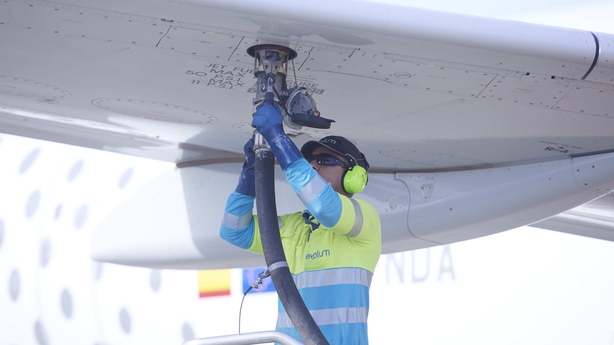Revenue of €2.55 billion could be generated each year in Ireland by 2050 through the production of sustainable aviation fuel (SAF), new research has found.
1,000 highly skilled jobs could also be created in the industry, the feasibility study claims.
The analysis was commissioned by SkyNRG and SFS Ireland, in a partnership supported by Avolon, Boeing and ORIX Aviation.
"Large-scale deployment of SAF and the transition of the global fleet to new technology aircraft are the two biggest near-term drivers that can progress the sector's net zero by 2050 goal," said Andy Cronin, CEO, Avolon.
"It is going to require large levels of investment and close collaboration across many stakeholders, and we value the Minister’s engagement to explore Ireland’s sustainable aviation fuel opportunity."
SAF is seen as an important tool in the future decarbonisation of the aviation sector, which accounted for 2% of global energy related CO2 emissions last year.
However, so far the amount of SAF being produced globally is a tiny fraction of what is required.
The aviation industry body, IATA, has set a goal for the sector of reaching net zero by 2050.
It estimates that SAG will deliver over 60% of the contribution needed to reach that target.
Currently the EU’s RefuelEU initiative requires fuel suppliers to blend SAF into the fuel available at all EU airports, rising from 6% SAF by 2030 to 70% by 2050.
But to even hit this target, Ireland will need around 10 SAF production plants with capacity of 80 kilo tonnes.
The analysis finds that the Power to Liquid (PtL) production of eSAF would be the biggest opportunity for Ireland.
eSAF is a synthetic fuel produced by combining green hydrogen with biogenic CO2.

"Significant progress is required for Ireland to be able to develop eSAF at scale, particularly to ensure renewable power is available in the scale required production of hydrogen in the required quantities," said Sheila Remes, Vice President, Environmental Engagement and Business Development, Boeing.
"The increased levels of offshore wind power generation that Government initiatives are targeting by 2030 will put the country in a much stronger position to develop a domestic SAF industry."
The report recommends that in order to advance Ireland’s capacity for SAF production, targets for it need to be included in the climate action plans.
Businesses also need to be incentivised to produce it, the analysis suggests, through tax credits, capital allowances and guaranteed minimum pricing.
It also recommends research and development funding and promotion among the country’s third level researchers and calls for reform of the planning process to allow plants to be built.
Storage and transport infrastructure will also be required it claims, along with collaboration between public and private sectors.
The report was published by the Minister for Enterprise, Trade and Employment, Simon Coveney, who said the Government is committed to engaging further with the sector to explore the potential.








